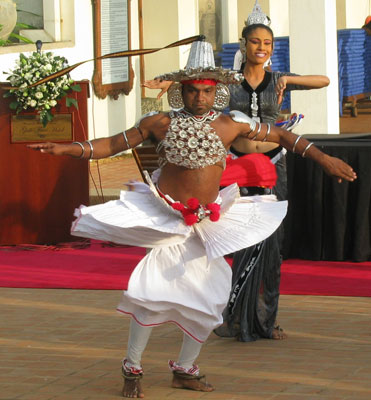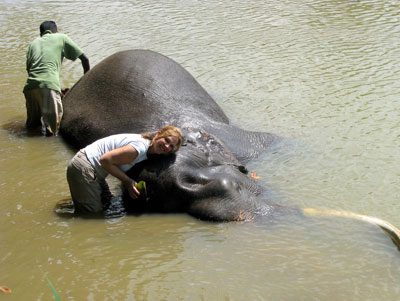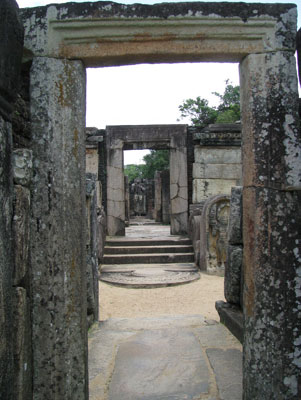Sri Lanka — Surprising and a bit surreal
by Teresa O'Kane, San Jose, CA
Sri Lanka is a place like no other. That’s what the marketing posters say, and why not state the obvious? But if I were in charge of marketing for Sri Lanka, my slogan would be, “Feel in the mood to drop down the rabbit hole? Come to Sri Lanka, where the unexpected happens.”
The Cannonball Run
In the capital city of Colombo, my husband, Scott, and I stayed at an old colonial hotel, the Galle Face (phone 941 12541010), which still feels “veddy, veddy” British. Expats working or passing through Colombo gather nightly for drinks on the hotel’s terrace overlooking the Indian Ocean. As guests of the Galle Face Hotel ($55-$300 per night), we were invited to watch an annual race called the Cannonball Run.
In the 1840s the area adjoining the hotel was used as a practicing ground for the British Royal Artillery Company. One day a young Ceylon lascar got the yips and shanked a 30-pound cannonball that went off course and ended up in the hotel dining room, unexploded.
Each March the hotel commemorates this mishap with a two-man footrace and a party. During our late-spring ’08 visit, the British High Commissioner and the American Ambassador competed for the title, the British contingent arriving at the beach with flair on an old London double-decker bus.
At 5 p.m. the pomp and steady rounds of cocktails commenced while British and American flags were offered to the crowd. After meeting the competitors we, along with a German family, chose the US flags. In the same way you check out a horse before a race, we noticed that the US Ambassador had very long legs and looked a few years younger than the British High Commissioner.
He also looked like the kind of man who had worked his way through college as a waiter, which was significant because, while the course was short, the runners each had to carry a full glass of champagne on a tray without spilling it while they ran.
The British High Commissioner won by a nose. With such long legs, I felt sure the US Ambassador sandbagged for diplomacy’s sake. Or maybe he was off his oats. No matter! The race was over and the party commenced in earnest around the pool bar.
The food was delicious and the drink, plentiful. Too plentiful! If someone had told me that someday I would be at a swank party in Sri Lanka singing the SpongeBob SquarePants song, I wouldn’t have believed it. But, like I said, the cocktails were flowing.
At 10 p.m. when the waiter announced, “Beer finished,” we knew the party would soon be over. The night ended with fireworks exploding overhead. Our first day in Sri Lanka had been pretty good.
Two days later, on my birthday, we fell farther down the rabbit hole as I bathed an elephant in a river.
A dream come true
Several months before arriving in Sri Lanka I had an extremely vivid dream. In it I was bathing an elephant in a river. The dream was detailed down to the trousers I was wearing, a pair of Capri khakis with The North Face logo on the pocket, which I didn’t own. (After the dream I went on an elephant-washing-trousers hunt. For future reference, such trousers can be found at REI.)
Fast-forward six months and we were on a train from Colombo to the elephant orphanage in Pinewella. During the journey, vendors came down the aisle selling a selection of deep-fried foods wrapped in their children’s corrected homework. In Sri Lanka, nothing is wasted.
At the elephant orphanage, visitors can watch baby elephants being bottle-fed by orphanage staff. If you are lucky, you can help feed them, too. Large families and tour groups from Colombo and Kandy arrived throughout the day to have their pictures taken with elephants before piling back into the waiting buses that take would them to the next stop on their itinerary.
But I wanted more than just a photo. I wanted to live my dream.
I asked one of the mahouts (elephant handlers), “Where do the elephants bathe?” and he gestured with head and hand in the direction of the exit. Then he proceeded to burst my bubble.
“No people can bathe elephant. Only mahouts bathe elephant.”
Turning away, I said to Scott, “This isn’t like the dream at all!”
Feeling deflated, I helped feed one of the baby elephants before starting toward the exit. Soon I felt a rumble and turned around to see 85 elephants behind me also heading for the exit but at a much quicker pace, so we hightailed it out the gates to the road. The elephant in the lead and apart from the others was enormous and very old. Two mahouts led him, one on each side, and talked to the elephant the whole time, giving him direction.
As the old elephant turned out of the gates, the mahouts led him away from the herd and began walking him up the road. One mahout gestured to me with his head, “Come.” So I did.
“What are you doing? Where are you going?” Scott asked excitedly.
“I’m not sure, but I think I am going with this mahout to bathe this elephant!”
Then I asked the mahout, Ranjith, through pantomime, “Why does this elephant not go with the others?”
He said, “Blind,” and indicated that the place the other elephants go to the river is too steep for the blind elephant to navigate.
We continued walking down the road until we finally came to a muddy path that led to the river, where the elephant immediately began sucking water up into his trunk and spraying it on his back and over us, too. Then the mahout told the elephant to get in the river, which he did.
“May I go in?” I asked.
He motioned that I should wait. Then he told the elephant to lie down in the river, which he did. Then I got in the river.
The mahout showed me how to scrub the elephant with a coconut husk. I scrubbed his whole body, kneeling on top of him to reach his back. I washed his tusks, which were incredibly smooth, and gently stroked his eyes with my hands.
Then the mahout asked the elephant to stand up and turn over, which he did, and we washed, rinsed and repeated on the other side.
I couldn’t believe it. It was my 50th birthday and I was exactly where I wanted to be doing exactly what I wanted to do. It was a dream come true.
The Elephant Orphanage is located about three kilometers from the Rambukkana junction on the Colombo-Kandy road. Travelers by bus from Colombo or Kandy can take the Rambukkana bus from the town of Kegalle.
Admission is around $10. There are a few guest houses, but most people stop only for an hour to see the elephants.
A quirky country
Serendipity: “the faculty of making happy and unexpected discoveries by accident.”
Sri Lanka was first known as Serendib, the source of the word “serendipity.” They should never have changed the name; it fits the Sri Lankan experience and her people so well.
Despite being identified mostly by her 25-year-long civil war, Sri Lanka is intrinsically gentle. The first sound heard on a Sri Lankan morning is that of someone sweeping — the street, the dirt, the grass — with a broom made of long, thin twigs. Swish. Swish. Swish. Every morning the same rhythmic sound awakened me.
Sri Lanka is a place where bar snacks are called “small munch” and where, if you ask, “What do you call that type of monkey?” you will be answered, with patience and extreme enunciation, “We call this ‘monkey’.”
If you leave your shoes outside your guest house door, someone will come along and warn, “Monkey take shoe,” or if you try to eat your lunch out on the porch, someone else will caution, “Monkey attack food.”
It is a place where no matter how flash your hotel is, there is still a man who stands patiently all day on the grounds using a slingshot to keep the crows and monkeys at bay.
It’s the country where we enjoyed bedsheets with the highest thread count yet in all our travels, but pillows were still mostly hard like bricks.
Sri Lankans love you to love their country. Everyone we met asked, “How do you like my country?”
We always answered, truthfully, “It is very beautiful. You have so much nature and so many interesting cultural sights. We love it!” And they would smile broadly, happy that their country pleased another.
We wanted to add, “No country has been more humid or made us sweat more,” which was also the truth, but I don’t think that would have pleased them as much. To avoid the monsoon, travel to Sri Lanka from November to March, which is considered the dry season. We arrived at the beginning of the “wet.”
Galle Fort and Polonnaruwa
Periodically during our 45-day visit, we were advised to avoid large public gatherings, so during the week-long Hindu New Year’s celebrations we stayed inside the former Dutch walled city of Galle Fort, which is mostly Muslim.
Life inside the old fort walls of Galle was a delight. We had an airy room at the Ocean View Guest House (phone +94 921 2242717, e-mail jewelgem@sltnet.lk) at $16-$19 per night, with a terrace overlooking the ramparts and the sea. Every morning as we had our coffee, we watched the same characters pass by on the rampart wall.
First the kingfisher would post himself on the power line across from our balcony and wait for bugs to walk by. Then the total number of goats in the fort, four, grazed the new shoots of grass that had cropped up overnight. Then one of the two monkeys in the fort would swing through the coconut trees, sometimes landing on the terrace just to see me jump. Later, some of the fort’s human residents would stroll the wall for exercise, the dads tending to their children like emperor penguins would.
Despite the superb location and amenities of the hotels we stayed in, such as the Galle Face, room rates were reasonable in 2008. The cease-fire that lasted from 2002 to 2008 during the decades-long civil war discouraged tourists from visiting Sri Lanka. In January ’08, when the cease-fire officially ended, tourism fell even further.* At the time of our visit, most of the hotels or guest houses we stayed in were empty.
We had lots of accommodations to choose from at bargain prices. For only $41 we stayed at the Polonnaruwa Rest House (phone 027 222 2299, http://ceylonhotels.lk), in the former ancient capital of Polonnaruwa, in the same room in which Queen Elizabeth II rested her crown in 1954. But it was not as much of a bargain as it sounded — the room hadn’t changed much since then. The loo definitely dated from the ’50s.
Still, we called each other Liz and Philip for two nights.
Looking back
I miss Sri Lanka. I miss her stunning natural beauty and friendly people. I miss the pink sunsets and stupendous nightly thunder-and-lightening shows. I miss the beaches and watching cricket games played on the sand. I miss the charming guest houses.
But the thing I miss most about Sri Lanka is the bird I called Curly. He sang each morning just like Curly from the Three Stooges — “woob-woob-woob-woob-woob!” but without the “nyuk-nyuk-nyuk” at the end. It is a sound that can’t help but make you smile. ITN
*Note: according to the US Department of State, “On May 19, 2009, the Sri Lankan government announced that it had achieved victory over the Liberation Tigers of Tamil Eelan, an armed insurgent group, after 25 years of civil conflict. Despite the conclusion of hostilities, remnants of the insurgency group remain. The government of Sri Lanka’s security posture remains heightened.”




